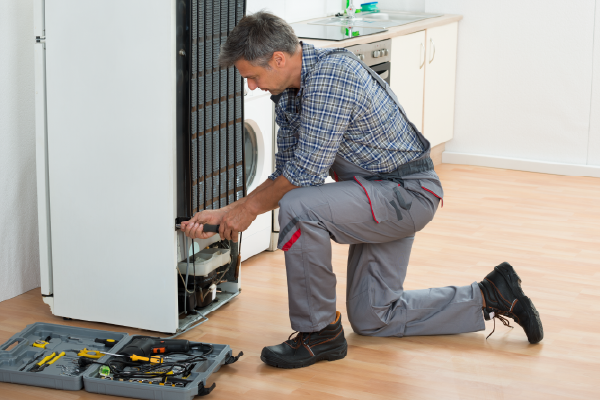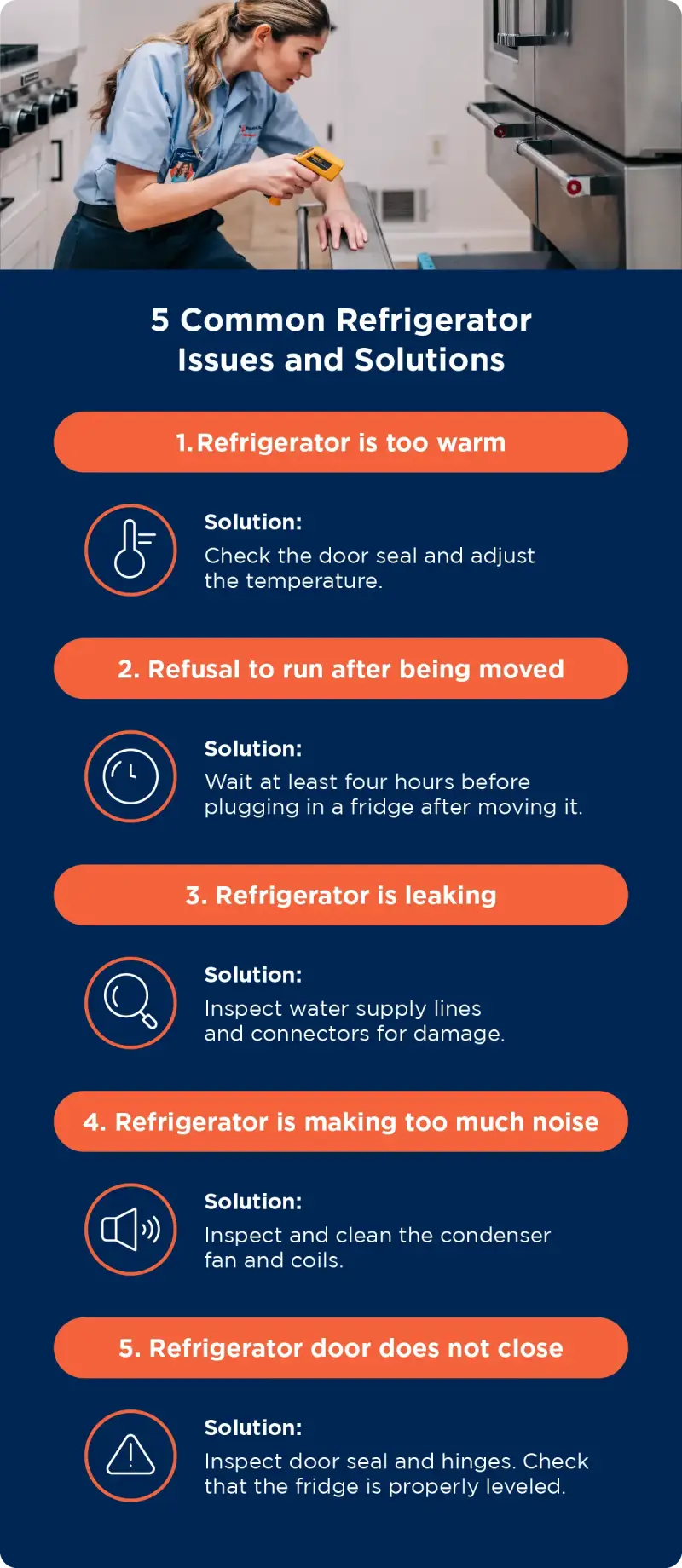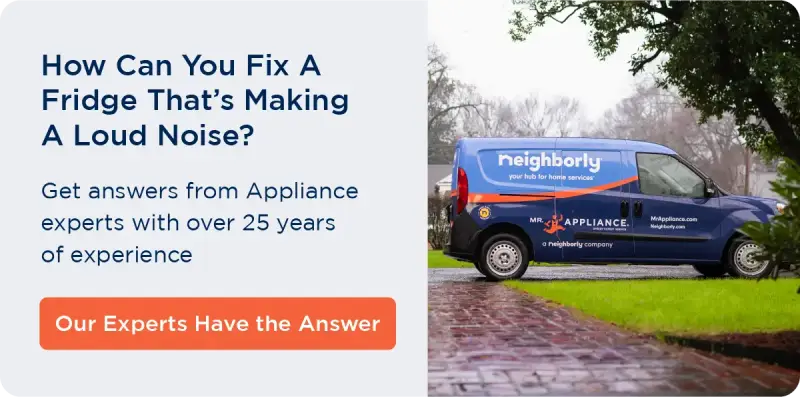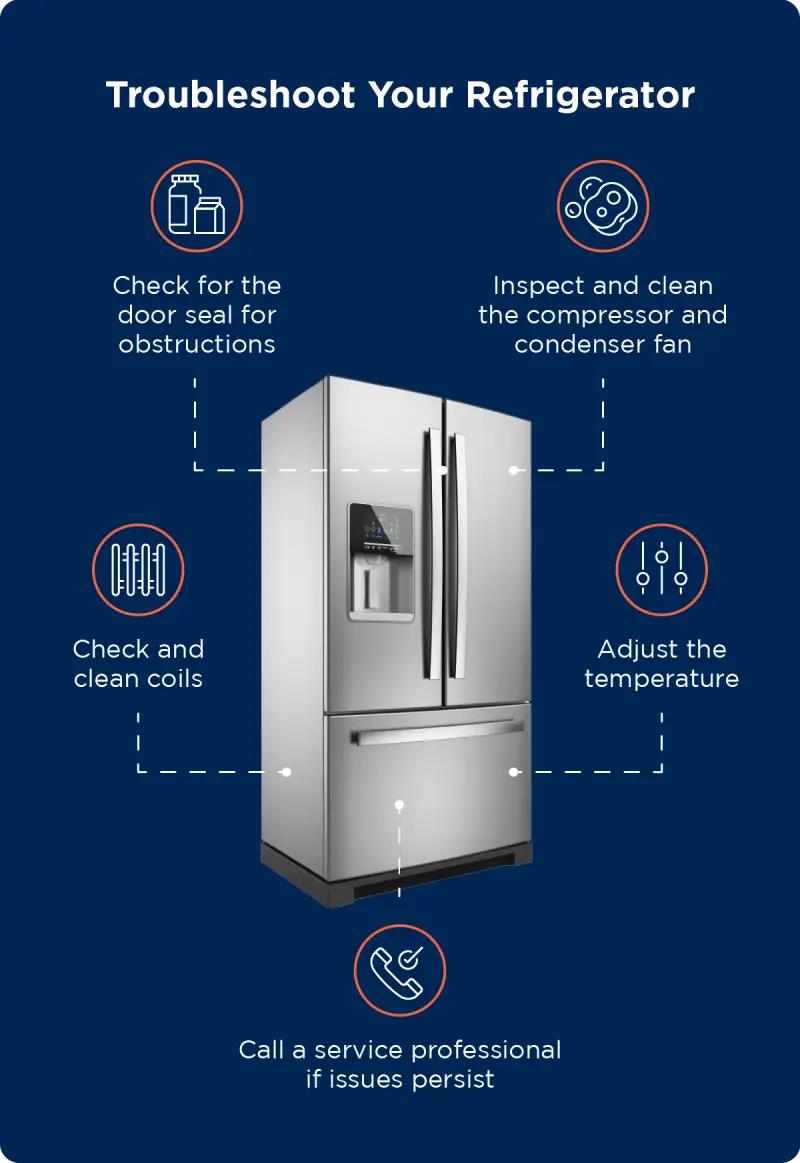11 Common Refrigerator Issues and How to Fix Them

Is your refrigerator acting up? Maybe you’re noticing your favorite yogurt keeps freezing and ruining your morning routine. The typical refrigerator lifespan is 10 to 18 years, so this appliance should last a long time. It’s possible to troubleshoot a refrigerator issue and get several more years out of one, even if it stops working. Here’s how to resolve the most common refrigerator issues.
Easy Methods to Troubleshoot Refrigerators
There are a few things you can do to troubleshoot a refrigerator issue. First, check the manufacturer’s manual to see if it has a specific recommendation for your issue. Always turn off the appliance before troubleshooting, and shut off the water supply if you plan on looking at the water dispenser or icemaker.
Inspect common problem areas like the fridge’s coils, fans, and gasket. Keep reading for our specific recommendations based on the 11 most common refrigerator issues.

1. Refrigerator Is Too Warm
How to Troubleshoot:
- Make sure the fridge is receiving power
- Adjust the refrigerator thermostat
- Unblock the vents for the fridge and freezer
- Vacuum the coils under or behind the refrigerator
A fridge that is working properly should maintain a consistent temperature of between 37 and 41 degrees. If the fridge is still not getting cold after trying the above tips, the condenser fan or evaporator fan could be broken. These refrigerator issues require attention from an appliance repair professional.
2. Everything in the Refrigerator Is Freezing
How to Troubleshoot:
- Check if the thermostat is defective by turning it to the highest setting and listening for a click
- Adjust the temperature settings (while using a thermometer to ensure it’s below 40 degrees Fahrenheit)
If everything in your refrigerator is freezing, it’s likely an issue with the thermostat, thermistor, or temperature control board. These parts all communicate with each other to regulate the fridge temperature. You can check if the thermostat is working yourself, but checking the thermistor or temperature control board will typically require professional help.
3. Freezer Has Frost Buildup
How to Troubleshoot:
-
Inspect the door seal for any damage or cracks
Old freezers are especially prone to frost buildup. If you’re experiencing this refrigerator issue, check for a cracked door seal, allowing warm, moist air to enter. If that’s not the problem, there could be something wrong with the refrigerator defrost system. You’ll need a professional to help with this type of freezer repair.
4. Broken Ice Maker or Water Dispenser
How to Troubleshoot:
- Pull the fridge away from the wall and look for any kinks or tears in the water supply line
- Make sure the water inlet valve is open
- Check the water filter for debris and replace it if necessary
Modern refrigerator/freezer combos often have built-in ice makers and water dispensers for convenience. If yours has suddenly stopped dispensing water or making ice, you can check the water supply lines and inlet valve at the back of the fridge. If the water inlet valve isn’t to blame, one of the ice-making mechanisms could be malfunctioning. Let a professional handle this more in-depth repair.
5. Fridge Won’t Run After Being Transported
How to Troubleshoot:
-
After transport, wait at least four hours before turning the fridge on
If you move your refrigerator to a new home, keep it as upright as possible. What happens to a refrigerator if you lay it down? The lubricant escapes from the compressor into the cooling pipes. If you run the appliance too quickly after it has been on its side, the compressor could be permanently damaged, and the fridge will no longer work. If you must lay your refrigerator down, give the lubricant several hours to settle before turning the appliance back on.
6. Refrigerator Is Leaking
How to Troubleshoot:
- Locate and shut off the water supply
- Inspect the water supply line and connectors for leaks
If the refrigerator is leaking, it’s often an issue with the water supply lines that support the ice maker or water dispenser. You might need to replace the supply lines or just the connectors. Regardless, hire a professional to diagnose and repair the leak.
7. Refrigerator Is Making Too Much Noise
How to Troubleshoot:
- Unplug the appliance
- Inspect the back of the fridge for signs of wear and tear on the fans for the condenser
- Dust and clean the fans
From time to time, you might notice your fridge making noise as it cycles. However, very loud or abnormal noises typically indicate an issue with the appliance’s fans. Cleaning the fans might silence a loud fridge, but if the noise persists, you should call in a professional to replace the fans.
8. Refrigerator Door Does Not Close
How to Troubleshoot:
- Ensure items in your fridge aren’t preventing the door from closing
- Inspect the seal on the fridge door for alignment or damage and replace if necessary
- Use a level to check that the fridge is properly balanced
If a refrigerator door doesn’t close properly, this leads to several problems, such as inconsistent temperature or frost buildup. You need a proper seal to ensure your food stays at a safe temperature. Sometimes, this is as easy as rearranging your groceries to ensure nothing is blocking the door. Common causes include a broken door seal, an unbalanced fridge, or worn-out hinges.
9. Refrigerator Light Isn’t Working
How to Troubleshoot:
- Tighten the bulb
- Replace the bulb
Luckily, most fridges still cool properly if the light goes out unless there’s a more complex electrical issue going on. Try tightening or replacing the bulb to see if that fixes your issue. If not, there might be a problem with the wiring in the refrigerator, which is a job for professionals.
10. Too Much Moisture Inside Fridge
How to Troubleshoot:
- Check the door seal
- Use fridge desiccant as a short-term solution
If you notice puddling, condensation, or frost inside your refrigerator, then the inside environment is too moist. If you live in a very humid environment, an improper seal or opening the fridge too often can create this issue. If the fridge isn’t set to the proper temperature, it can also cause condensation. A refrigerator desiccant can help in a pinch, but you should have a service professional look at the fridge for a long-term solution.
11. Refrigerator Is Cycling Too Frequently
How to Troubleshoot:
- Check condenser and evaporator fans for cleanliness or damage
- Ensure the temperature settings are correct for the fridge and freezer
A broken fridge might cycle all day, driving up your electrical bill and even affecting your groceries. A quick cleaning session for the condenser and evaporator fans or double-checking the temperature settings might resolve the issue. If this doesn’t work, there’s likely a more complex electrical issue, which a service professional can help you with.

When To Call a Professional
Not every refrigerator issue is a DIY job. You should call a professional if you need help:
- Replacing parts
- Repairing electrical issues
- Diagnosing issues after trying DIY fixes
When in doubt, it’s better to let a professional handle the issue rather than worsen damage to your appliance. With the Neighborly Done Right Promise™, you can feel confident with appliance repair from your local Mr. Appliance.
FAQ About Refrigerator Issues
What are the most common problems with refrigerators?
The most common issues with refrigerators include incorrect or inconsistent temperature, moisture inside the appliance, and water dispenser or ice maker problems. These issues might be resolved by adjusting the temperature settings, checking the door seal, or calling in a professional for help.
What is the first thing to check when a refrigerator stops cooling?
If a refrigerator stops cooling, the first things you try to fix the issue include adjusting the temperature, testing the door seal, and cleaning the condenser fan.
How do I find out what’s wrong with my refrigerator?
Many refrigerator problems stem from issues with condenser or evaporator fans, water supply issues, door seals, or temperature settings. If you can’t identify the problem after checking these areas, call in a service professional to help diagnose the issue.
How do refrigerators work?
Refrigerators use cooling mechanisms such as the compressor, condenser, and evaporator along with refrigerant to remove heat from inside the fridge and maintain a consistent temperature.
How long do refrigerators last?
The average lifespan of a refrigerator is 10 to 18 years, depending on how well it’s maintained and repaired. Keeping the refrigerator clean and well-maintained can maximize the lifespan.
Schedule Refrigerator Repair with Mr. Appliance®
If your efforts to troubleshoot the refrigerator don’t pan out, your local Mr. Appliance is here to fix your refrigerator issues.
We service all sorts of fridges and freezers and many of the major brands, so give us a call or schedule a service at a time that best suits you.
This article is intended for general guidance only and may not be applicable to every situation. You are responsible for determining the proper course of action for your property and your situation. Mr. Appliance is not responsible for any damages that occur as a result of any advice or guidance derived from blog content. For the most accurate guidance, contact an independently owned and operated Mr. Appliance business for a professional custom and on-site assessment.
 Click to call
Click to call


